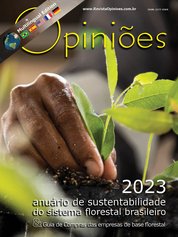Cenira de Moura Nunes
Gerente Geral de Meio Ambiente da Gerdau
AsCP23
Do compliance a geração de valor ambiental
Desde o início de minha vida profissional, há quase três décadas, estou envolvida na gestão ambiental de grandes indústrias. No final dos anos 90, a principal função de uma área voltada ao meio ambiente era tão somente atender à legislação e manter as empresas longe de multas e interdições. O valor associado ao tema era o compliance.
Próximo aos anos 2000, a norma ISO 14001 propiciou um maior desdobramento de práticas voltadas ao meio ambiente em todos os processos da indústria por meio dos levantamentos de aspectos e impactos, tratativas de não conformidades e análises críticas. O valor da questão ambiental se tornou mais compartilhado com os colaboradores das organizações, com foco em evitar impactos, indo além do simples atendimento legal. Nos últimos anos, a visão da sociedade em termos ambientais tem se modificado e se tornado cada vez mais crítica. Não basta uma licença ambiental emitida em papel.
Próximo aos anos 2000, a norma ISO 14001 propiciou um maior desdobramento de práticas voltadas ao meio ambiente em todos os processos da indústria por meio dos levantamentos de aspectos e impactos, tratativas de não conformidades e análises críticas. O valor da questão ambiental se tornou mais compartilhado com os colaboradores das organizações, com foco em evitar impactos, indo além do simples atendimento legal. Nos últimos anos, a visão da sociedade em termos ambientais tem se modificado e se tornado cada vez mais crítica. Não basta uma licença ambiental emitida em papel.
É preciso comprovar que os impactos socioambientais associados àquela operação estão, no mínimo, neutralizados. Investidores demandam a garantia de que riscos voltados a impactos ao meio ambiente estão sendo geridos para evitar resultados negativos no negócio. As partes interessadas demandam mais conhecimento da performance ambiental das empresas para consumir seus produtos e serviços.
As evidências de que as mudanças climáticas afetarão diretamente a sobrevivência da humanidade elevaram o nível de exigência e resposta das empresas. Episódios recentes, como a pandemia da Covid-19 e o conflito entre Rússia e Ucrânia, potencializaram discussões sobre como a humanidade deve se preparar para enfrentar eventos climáticos extremos de abrangência global, além da necessidade de acelerar a transição energética para uma matriz mais renovável e não dependente de combustíveis fósseis. Esse momento tende a levar as empresas a um ponto de inflexão: como entregar à sociedade produtos e serviços que visem não somente o lucro, mas também o impacto positivo para o planeta?
O consultor britânico John Elkington foi o responsável pela definição do conceito do Triple Bottom Line, no início dos anos 90, sendo um dos precursores da visão de que as organizações deveriam buscar o equilíbrio econômico, social e ambiental para se manterem sustentáveis. Com as evidências da limitação dos recursos naturais e da necessidade de avanços na questão social, o pilar econômico se torna cada vez mais contido e dependente das demais dimensões.
O próprio John Elkington, em seus mais recentes trabalhos, defende que o valor das empresas dependerá dos impactos positivos que entregam ao planeta e à sociedade. A economia tradicional seria substituída, então, por uma versão regenerativa. A sociedade deveria compensar os impactos ambientais e sociais gerados pelo capitalismo tradicional e pelos eventos imprevisíveis e de impacto global, como a própria pandemia.
A indústria de base, historicamente associada a efeitos negativos em seu processo produtivo, precisa, nesse contexto, se reinventar para entregar os valores essenciais para essa nova economia. O aço é material presente em tudo a nossa volta e parte essencial para a trajetória de neutralidade do planeta. Não há torre eólica, parque solar ou carro elétrico sem aço. O aço é um material infinitamente reciclável e base de uma economia mais circular. A questão atual é como agregar valor sustentável a um produto tão relevante à sociedade.
Um dos maiores dilemas do setor é entregar um aço com menor intensidade de emissões de gases de efeito estufa em um momento em que as tecnologias disruptivas nessa direção ainda não são escaláveis. No Brasil, pelas características únicas do nosso país, conseguimos desenvolver uma rota alternativa, substituindo o carbono de origem fóssil por renovável. A madeira cultivada se transforma em biorredutor para a produção de aço. As florestas energéticas de reflorestamento reduzem a pressão do desmatamento sobre as florestas nativas, contribuindo para a adequada utilização de terras degradadas, respeitando os conceitos de cultivo mínimo do solo e preservando áreas destinadas à conservação da biodiversidade.
O aço produzido por essa rota apresenta menor intensidade de emissões, sendo diferenciado à sociedade e ao meio ambiente. É o valor da sustentabilidade ambiental assumindo seu papel em uma economia regenerativa. Nesse contexto, o desempenho esperado do profissional do meio ambiente também se transforma. Compliance e transparência são básicos e inegociáveis, como sempre. Guiar os negócios para uma economia que respeite os limites do planeta e agregue valor sustentável aos produtos e serviços é a missão.




